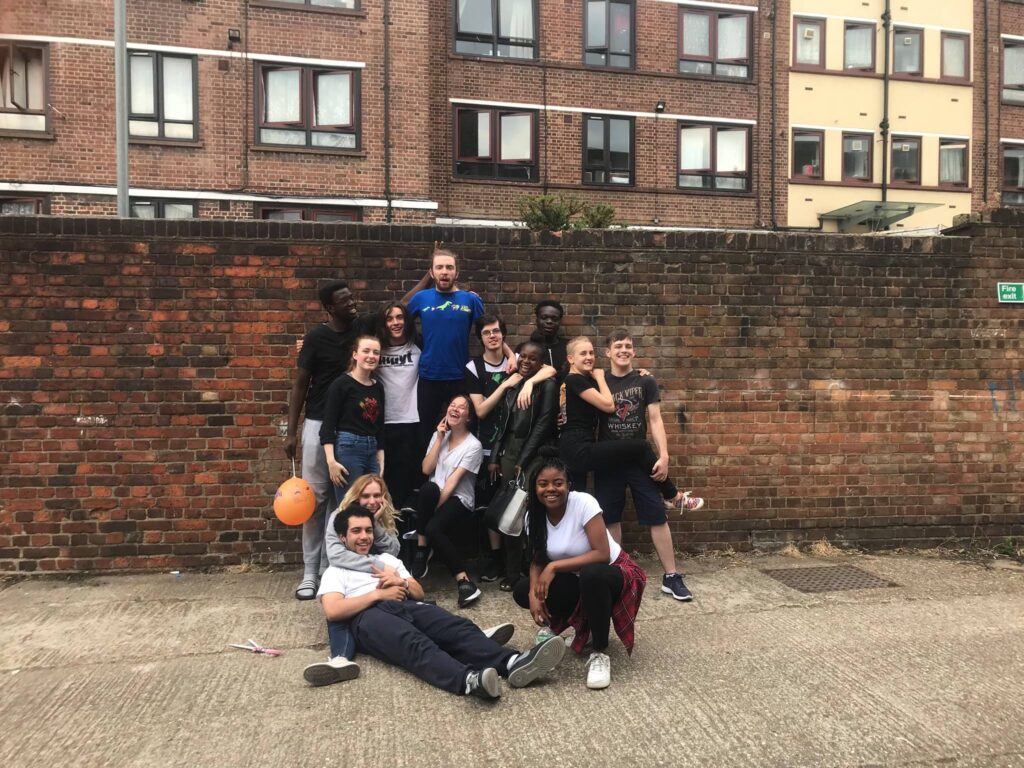New play explores what makes us ‘Switch’ against those who exploit us
Drama has huge power to prompt social change and it is astonishing that the outrages heaped on the people of the UK by the Conservatives since 2010 have not led to an enormous upsurge of social comment in the theatre.
Today I saw a new play that takes a step towards rectifying that omission.
Switch takes its title from a slang term referring to people who turn on others after suffering severe provocation. They “switch”, usually from passive tolerance to extreme violence.
The play examines how people were provoked into such violence in two historical cases: The Rebecca Riots in rural Mid Wales during the 1830s and 40s, and the Hackney riot of summer 2011.
I had to look up the Rebecca Riots. They were prompted because farmers who were suffering extreme poverty because of poor harvests were being subjected to high rents, rates, tithes and tolls, which were increased to an extorionate degree by the trusts running them – which had been created to maintain the roads but allowed them to go to ruin instead, diverting the money to other uses.
The 2011 riots are still fresh in my memory. The spark that triggered the violence was the shooting of Mark Duggan by police in London, but the city had become a tinderbox because of the grotesquely repressive decisions of the Coalition (Conservative and Liberal Democrat) government. Perhaps it is because this play is a collaboration between two youth theatre groups (Mid Powys Youth Theatre and Immediate Theatre, of Hackney) that the emphasis was placed on the closure of youth centres, cuts to EMA (Education Maintenance Allowance) and rises in university tuition fees, along with the introduction of the Bedroom Tax that threatened to pitch poor families out of their homes, and unemployment following the international financial crisis of 2008 that meant people were finding it impossible to make ends meet.
One scene plays out the frustrations of young people whose youth centre had been closed without warning and who, left on the street with nowhere to go, were preyed on by police looking for easy arrests.
In both cases, the players argue, it was desperation – the sheer impossibility of a situation forced on them by an uncaring elite – that led the impoverished to violence.
And in both cases it was put down harshly. In the 1840s, the troops moved in and rioters were faced with the threat of transportation to Australia, among other harsh penalties. Seven years ago, more than 1,000 arrests were made and courts dealt out harsh punishments – one person was sentenced to 16 months in prison for stealing a single ice cream.
Did the riots lead to social change for the better? That is debatable. After Rebecca, some rent reductions were achieved and toll rates improved, but that was about it. Hackney had no discernible effect on the decisions of the government. EMA was never restored; tuition fees are still high; youth centres are still closed. The Tories would argue that employment has improved, but we all know that in-work poverty has skyrocketed because the new jobs pay starvation wages.
Rebecca is better-known as the inspiration for later Welsh protests, which raises an important question about Hackney. Are we all sitting on a time-bomb that is waiting to blow – an explosion that is only being delayed by the anaesthetic pronouncements of a complicit right-wing press that keeps telling us, in the face of the facts, that we’ve never had it so good?
Of course, the riots weren’t just about frustration with oppressive social conditions. Some people took advantage of them for their own gain and Switch does not skirt over this uncomfortable fact. The Rebecca riots petered out because groups had started masquerading as Rebecca to carry out criminal acts. And Hackney saw its fair share of looters. Switch stages a TV interview with rioters who boast about the items they lifted – even though, in real terms, the money they expect to make from them is negligible.
But the causes of a riot should not be downplayed because of opportunist criminals. They simply took their chance under cover of a genuine expression of anguish by a downtrodden peasantry who rose up – leaderless – against their oppressors.
The lack of a leader is the reason such expressions fail to yield results, in my opinion. If I had been involved in 2011, I would have wanted to cut off the ability of the police and the armed forces to react, and then I would have targeted the mechanisms of government and the headquarters of those who either supported the government in its activities or benefited from its decisions (let us not forget that the UK’s richest have seen their income multiply massively while the rest of us have suffered.
But I suppose that would mark the difference between a riot and a revolution.
Switch isn’t perfect. It doesn’t really address the difference between those with a genuine grievance and those who took advantage, and it doesn’t make a strong enough point of the fact that nothing got better after 2011.
But it is a muscular piece from a committed group of young performers, that raises serious questions and asks the audience to find their own answers.
As attempts to revive social and political commentary in drama go, it’s a good start.
Visit our JustGiving page to help Vox Political’s Mike Sivier fight anti-Semitism libels in court
Vox Political needs your help!
If you want to support this site
(but don’t want to give your money to advertisers)
you can make a one-off donation here:
Here are four ways to be sure you’re among the first to know what’s going on.
1) Register with us by clicking on ‘Subscribe’ (in the left margin). You can then receive notifications of every new article that is posted here.
2) Follow VP on Twitter @VoxPolitical
3) Like the Facebook page at https://www.facebook.com/VoxPolitical/
Join the Vox Political Facebook page.
4) You could even make Vox Political your homepage at http://voxpoliticalonline.com
And do share with your family and friends – so they don’t miss out!
If you have appreciated this article, don’t forget to share it using the buttons at the bottom of this page. Politics is about everybody – so let’s try to get everybody involved!
Buy Vox Political books so we can continue
fighting for the facts.
The Livingstone Presumption is now available
in either print or eBook format here:
Health Warning: Government! is now available
in either print or eBook format here:
The first collection, Strong Words and Hard Times,
is still available in either print or eBook format here:











Huh?
Mike where’s this article gone?
I’ll give you two other examples that also resulted in the Government thudding its iron fist; The Peasant’s Revolt (1381) and the Gunpowder Plot (1605). Today, as I have said, many times, we have become a nation of sleepwalkers but the people do not realise that they are being fed sleeping pills. Theatre does still challenge us but far less so in the mainstream, because it has become, in my opinion, largely about commercial interest; producers seem to be far more risk averse and opt for “safe bets;” stage versions of successful movies, jukebox musicals and celebrity casting; even pseudo-celebrity. Previous generations seemed to be far more political, both in music and theatre but with our Media and Social Media and “celebrity” culture obsession, people have become blind to what is happening and a strange kind of apathy has taken hold. People swallow lies and political narratives, wholesale, even to the extent that they believe that all people on benefits either squander them, or are living the life of Reilly. We even believe that all actors are rolling in it, when little could be farther from the truth.
Overall, I think that people are desperate and there concern is for themselves their families and their futures, on top of which is the feeling of isolation and helplessness. To whom do you turn, when those who are supposed to help you cannot, or do not?
Vox Pilitical appear unprepared to protect people who are stalked and harassed on their Facebook page.
For the record: This commenter, going by the name Gregory Smyth, was on the Facebook page making personal attacks on other commenters, so I banned him.
We have a rule there, as here: “Play the ball, not the other player.”
I won’t protect those who break the rules. I ban them.
Mr Smyth was banned from there. Now he’ll be banned from here as well.